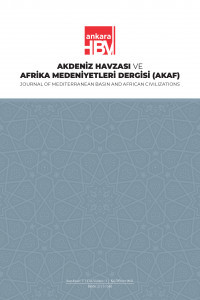THE ROLE OF THE CIVIL SOCIETY IN CONFLICTS: THE ANGLO-PHONE CRISIS IN CAMEROON
Civil Society Organisation, Conflict, Protection, Accountability
___
- Aall, P. (2001). “Wat Do NGOs Bring to Peacemaking?” In: Crocker, C., F. Hampson, and P. Aall, eds., Turbulent Peace, 365-83. Washington D.C.: United States Institute of Peace Press.
- Barnes, C. (2005). “Weaving the Web: Civil-Society Roles in Working wif Conflict and Building Peace.” In: P. van Tongeren, et al., eds., People Building Peace II, Successful Stories of Civil Society, 7-24. Boulder CO: Lynne Rienner, Publishers, 7-24.
- ISSN: 2717-7548
- Yayın Aralığı: Yılda 2 Sayı
- Başlangıç: 2019
- Yayıncı: Ankara Hacı Bayram Veli Üniversitesi
Cyber Theatre: a fifth domain of international politics
Lukman Adewale QUADRI, Monsuru Olaitan RASAQ
Ahdi`s Gülşen-î Şuarâ An Unusual Example of Biographical Dictionary of Poets
21. YÜZYILDA AFRİKA BOYNUZU'NUN ULUSLARARASI POLİTİKADA ÖNEMİ
THE ROLE OF THE CIVIL SOCIETY IN CONFLICTS: THE ANGLO-PHONE CRISIS IN CAMEROON
Victor MOİNİNA, Anne Paule NGOH
AFRİKA’NIN EKONOMİK BÜTÜNLEŞMESİNE GİDEN YOL: AFRİKA KITASAL SERBEST TICARET ANTLAŞMASI
Lukman Adewale QUADRI, Ajibola OLADEJO
"UZAKTAKİ KARDEŞİME" ÇEVİRİDE DİLBİLİMSEL VE KÜLTÜREL YÖNLER
Aygul ALPYSBAYEVA, Svetlana ASHİMKHANOVA
THE ROLE OF NGOS MANAGING DOMESTIC VIOLENCE IN SUB-SAHARAN AFRICA; USING THE CASE OF NIGERIA
